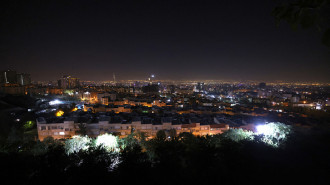Aaron Bushnell’s self-immolation evokes memories of 'despair martyrs' in Tunisia, Congo and elsewhere
Aaron Bushnell, a US airforce airman, died on Sunday just hours after lighting himself on fire in front of the Israeli embassy in Washington to protest his country's complicity in the Israeli genocide in Gaza.
Bushnell's action immediately evoked a long history of self-immolation as an act of extreme political protest, particularly in the "Global South".
On Sunday, 25 February, the 25-year-old American wore his military uniform as he appeared to livestream his self-immolation on Twitch. He yelled, "Free Palestine," until he collapsed in front of policemen, who were pointing guns at his burning body.
In this ultimate act of both resignation and self-sacrifice, Aaron mirrored, at once, the despair and defiance shown by previous figures, from Tunisia's Mohamed Bouazizi to Congo's Cedrick Nianza.
Tunisia: Mohamed Bouazizi
Bushnell's death reminded several people across the region of Mohamed Bouazizi, the vendor whose suicide fourteen years ago inspired millions to oust their long-lasting dictators.
On 17 December 2010, Mohamed Bouazizi, a 26-year-old Tunisian fruit vendor, immolated himself in protest of the confiscation of his cart and the humiliation inflicted upon him by police forces.
RIP Aaron Bushnell...
— Cihan Tugal (@CihanTugal) February 26, 2024
May the following months resemble those after the passing of Mohamed Bouazizi...
With the hope that, this time, the murderers and thieves are gone forever... pic.twitter.com/lp5hGNL5jT
Unlike Bushnell, Bouazizi did not leave a letter to the world calling for action. As far as is known, he was not politically engaged. However, his despair in the face of injustice resonated with millions of Tunisians, Egyptians, Libyans, Syrians, and other populations in the region who took to the streets in what was dubbed 'the Arab Spring.'
After a glimpse of freedom, Tunisians now live under the growing autocratic rule of President Kais Saied while facing a severe economic crisis. Many of them hope that Bushnell's action could serve as a wake-up call to revive Bouazizi's long-delayed Tunisian dream of freedom and to advocate for the liberation of Palestine.
If only this could serve as the wake up call that Mohamed Bouazizi's self immolation did in Tunisia 🇹🇳 #CeasefireNOW #StopTheGenocide https://t.co/z8UoCm3DBu
— Rami Ayari (@Raminho) February 25, 2024
Democratic Republic of Congo: Cedrick Nianza
Shouting, "Congo na nga" (my Congo), a young man named Cedrick Nianza self-immolated himself in the Democratic Republic of Congo (DRC) a year after Bouazizi's death.
Ninaza self-immolated himself in protests of corrupted elections and decades of injustice and impoverishment in the central African country.
Last November, another Congolese man committed a similar act to draw attention to the ongoing genocide in Congo.
Racked by conflict for more than 30 years, the DRC's insecurity is caused by complex and deep-seated factors, as well as a multitude of actors, including the M23 rebel group, Congolese and foreign forces who are battling for control.
Nearly 7 million people have been displaced due to ongoing conflict and violence in the country, according to the International Organisation of Migration.
From Morocco to Afghanistan: those we forgot their names
Self-immolation is an extreme protest tactic often adopted by artists, climate change activists, and ordinary citizens desperate to draw attention to injustices in their communities.
However, these acts often go unnoticed or become lost in the news cycle.
Last March, in Morocco, a little-known artist named Ahmad Jawad set himself on fire in front of the Ministry of Culture building in Rabat on World Theatre Day. His act was to protest the injustices and poverty small artists endure in the country.
However, little has changed since he died, as self-immolation became a normality in the North African kingdom. "Setting fire to oneself in Morocco achieves nothing," wrote Moroccan author Ali Anouzla following Jawad's death.
Lundi matin, un artiste marocain 🇲🇦 Ahmed Jawad, comédien de théâtre de la ville de Salé, s'est brûlé au ministère de la Culture (Rabat). pic.twitter.com/0Lr2PY1XzS
— IRIFIYEN ⵉⵔⵉⴼⵢⵏ ⵣ📚 (@RifainTEM) March 29, 2023
Recent self-immolation incidents in Morocco have become a distressingly common occurrence among marginalised groups. In 2016, a woman set herself on fire in protest against the confiscation of her bread sales, vital for her struggling family. In the same year, a teenage girl did the same after her rapists walked free without consequence. Countless other Moroccans, their stories untold, have resorted to this extreme act.
"These individuals are not suicidal, desperate or losers because the decision to burn oneself in protest is not an easy one to make. It is a courageous attempt to preserve one's dignity and pride in the face of feeling helpless and having no prospects," added Anouzla.
In Afghanistan, for decades, dozens of women suffering opt for self-immolation yearly as their last statement against domestic violence and to escape the abuse of their partners.
"It is a form of disclosure in itself. A woman will set herself alight and run out of her house, with the surrounding community as her witness. It is her scream, it is her desperation, and it is also her drawing a line that she is not going to endure violence anymore," wrote Ayesha Ahmad, senior lecturer at the University of London.

![Palestinians mourned the victims of an Israeli strike on Deir al-Balah [Getty]](/sites/default/files/styles/image_684x385/public/2024-11/GettyImages-2182362043.jpg?h=199d8c1f&itok=xSHZFbmc)


![The law could be enforced against teachers without prior notice [Getty]](/sites/default/files/styles/image_684x385/public/2178740715.jpeg?h=a5f2f23a&itok=hnqrCS4x)
 Follow the Middle East's top stories in English at The New Arab on Google News
Follow the Middle East's top stories in English at The New Arab on Google News
![Thousands of people have fled from Lebanon to Syria as a result of Israel's war [Getty]](/sites/default/files/styles/image_330x185/public/2024-11/GettyImages-2180619380.jpg?h=199d8c1f&itok=q4PK1BtW)

![Anwar Ibrahim (centre) said that Malaysia would support the Palestinian people against Israel's genocide [Getty]](/sites/default/files/styles/image_330x185/public/2024-11/GettyImages-1742690206.jpg?h=69f2b9d0&itok=ZYgNyRPM)